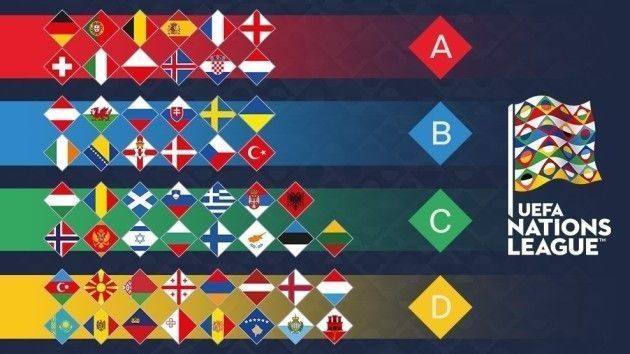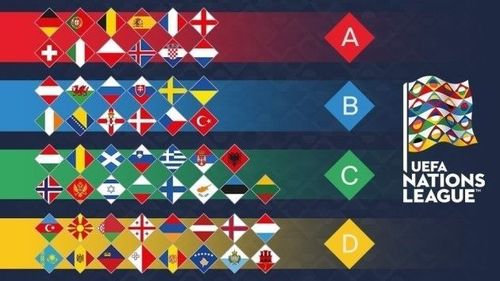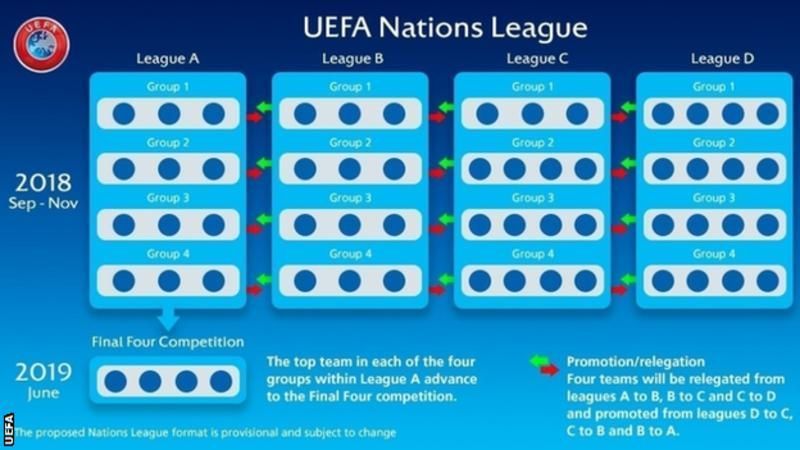
UEFA Nations League: Explaining the format of new biennial association football tournament

What is this UEFA Nations League? Who will play this tournament? Does it mean there will be no more Euros? When will its games be played? What is the format of this tournament? These are some of the common questions that were thrown at me over the past few days. Ever since the international break, when these matches started, people have been confused about it. The tournament is just at its infancy, and so it is understandable for people to have doubts.
With the aim of clarifying some of these doubts, let's talk football.
What is the UEFA Nations League?
Admittedly, we all hate the international break. Unless it’s a major tournament like the Euros or the World Cup, no one is much interested in international games. The friendlies and even the qualifiers seem dull amid the excitement of club football.
Well, fortunately, UEFA thought the same too. So, in order to replace the so-called ‘meaningless friendlies’ during the international break and bring in competitiveness to the international games, UEFA has started a completely new tournament called the ‘UEFA Nations League’. The UEFA Nations League is an international tournament that will take place every 2 years.
Who will play the UEFA Nations League?
Since the tournament is being organized by UEFA, only the European nations will be eligible to participate. UEFA has 55 members and all these member countries will play in the tournament.
Will it replace the Euros?
No. This tournament has been designed to co-exist with the Euros. It will mostly have the same teams playing in it, but the tournament itself will take place every 2 years unlike 4 years in the Euros. Also, the top teams in this tournament will directly qualify for the Euros.
How are the teams divided?
The 55 member teams have been divided into four mini-leagues namely League A, League B, League C, and League D. The teams in the four mini-leagues have been divided based on their UEFA Nations rankings. So, the teams in League A will consist of the strongest teams while League D will consist of the weakest teams.
Moreover, in each league, there will be four groups. The members of each group will compete among themselves to get the top spot.
How will the winners be decided?
There will be competition within the groups in each league. At the end of all matches, the top teams from each group will qualify for promotion or playoffs. Simply put, one winner from each group from League A will qualify for the playoffs.
Now just like any other league, there will be changes in the teams competing in the tournament. There will be promotions, relegations, and playoffs.
Promotion: Teams from each league will be able to join a higher league based on their performance. So, top performing teams from Leagues B, C, and D will be able to get a promotion to a higher league.
Relegations: The poor performing teams from each mini-league will get relegated to a lower league.
Playoffs: Winners from each group of League A will qualify for the playoffs where they will compete to win the title. Four teams (from League A) will qualify for the playoffs. These playoffs are scheduled to take place in June 2019. In the end, one team will be crowned as the winner of the inaugural UEFA Nations League.
Format of UEFA Nations League
Now this all may seem too complicated. But this figure provided by UEFA will surely clarify whatever we have talked yet. Check it out.

Group matches
The matchdays 1 and 2 have already taken place in September 2018. The matchdays 3 and 4 are taking place during the current International break in October 2018. Matchdays 5 and 6 will take place in November 2018.
Where can I watch live games?
The broadcasters will vary from nation to nation. However, for India, just like the UEFA's marquee tournament, the Champions League, the broadcasting rights are with Sony Pictures Network. This means viewers can easily watch the live games on channels like Ten 1, Ten 2 etc. Also, for online viewing, Sony Liv is the place to go.
Does it have a future?
Now that we have discussed all the technicalities, we should talk about the scope of this tournament. Based on the initial reaction of people, it's easy to assume that this tournament might not fare well. The response has been tepid at best.
But personally, I fell this tournament has a bright future. Since this is just the first edition, people will take time to adapt to this idea. However, all of us football fans would not mind a tournament where there is a title at stake. The added competitiveness will surely make the games much more interesting than the usual international friendlies. The only thing that could prove problematic is if people are willing to accept another tournament when they already have the Euros.